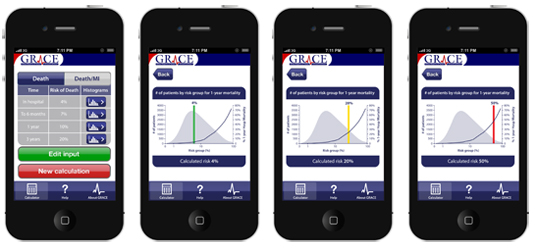
The GRACE app, pictured here, will help doctors better assess and treat patients with acute coronary syndrome.
A smartphone app built upon a multinational database developed and coordinated by the UMass Medical School Center for Outcomes Research (COR) will help doctors worldwide more easily identify patients who are at risk of dying within three years of a heart attack.
The app, which uses the Global Registry of Acute Coronary Events (GRACE) that was developed by a team of faculty members from the Center for Outcomes Research, a part of the Medical School’s Department of Surgery, will help doctors, nurses and paramedics quickly calculate the severity of a patient’s condition and help them offer the most appropriate immediate and long-term treatments, including whether or not a patient needs to be transferred to a cardiac care unit.
GRACE is an international observational database of outcomes for patients who are hospitalized with acute coronary syndrome (ACS), which enrolled more than 70,000 patients from over 100 hospitals in 14 countries between 1999 and 2006. The GRACE study provided a key basis for the ongoing, National Institutes of health-funded Transitions, Risks, and Actions in Coronary Events--Center for Outcomes Research and Education program, which is led by Catarina Kiefe, MD, PhD, the Melvin S. and Sandra L. Cutler Chair in Biomedical Research and chair and professor of quantitative health sciences and professor of medicine. The data in GRACE are used to create a risk score for cardiac patients so that health care providers can determine the best course of care following a heart attack.
The app was developed through a partnership between UMMS and the University of Edinburgh and is available for Android and Apple devices for free. Prior to development of the current version, which is called GRACE 2.0, the original version of the app was available for Apple devices and in a web version for use in health care facilities. The source code for the risk model has also been shared with hospitals to incorporate into their bedside electronic health information systems.
Prior to the roll out of the new version, which was announced this month at the European Society of Cardiology Annual Scientific Congress in Amsterdam, the ACS risk model had been fully vetted by major health care quality and cardiology associations and had been written into consensus guidelines for evaluating heart patients.
“The GRACE ACS Risk Score is already recommended in clinical practice guidelines from the European Society of Cardiology and National Institute for Health and Care Excellence in the United Kingdom,” said Frederick A. Anderson Jr., PhD, research professor of surgery and qualitative health sciences. “Also, the U.S. Agency for Healthcare Research and Quality recently added the GRACE Score to its recommended guidelines for managing ACS. It will enable clinicians to identify whether patients are at risk of a repeat attack, both shortly after the first attack and also over the next three years.”
Dr. Anderson led the development of GRACE along with colleagues from the UMMS Division of Cardiology, including Joel Gore, MD, the Edward Budnitz, MD, Professor of Cardiovascular Medicine and professor of medicine, and Robert Goldberg, PhD, professor of medicine. Development of the app was led by Keith Fox, MBChB, Duke of Edinburgh Professor and Chair of Medicine at the University of Edinburgh, with funding from AstraZeneca and the British Heart Foundation. Senior statistician Gordon A. FitzGerald, PhD, research assistant professor of surgery, led development of the risk assessment algorithms that allows the app to predict future outcomes for current heart patients.
Treatments to prevent repeat heart attacks can have unwanted side effects, so the app will help clinicians decide whether the benefits of certain therapies outweigh the risks of side effects to individual patients. Risk of repeat heart attacks are calculated by taking account of a patient’s heart rate, blood pressure, kidney function, severity of original attack and history of heart failure.
“One in five patients is likely to die within five years of their initial heart attack. Identifying those most at risk of a repeat heart attack means we can better tailor treatments to the individual and prevent further attacks,” said Professor Fox.
For more information, visit the UMMS Center for Outcomes Research GRACE website or the University of Edinburgh Grace website.